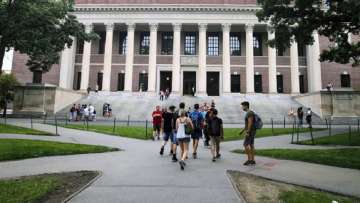India sent over 202k students to US in 2018-19, second largest after China
Students from India and China account for more than 50 per cent of international students, said the report that was released by the Institute of International Education (IIE) and US Department of State's Bureau of Educational and Cultural Affairs.

According to the '2019 Open Doors Report on International Educational Exchange', more than 202,000 students from India were sent to the United States in 2018-19. The number is the second largest after China which for the tenth consecutive year remained the largest source of foreign students in America, according to the report released on Monday. The report also said the number of foreign students in the US set an all-time high in the 2018/19 academic year, the fourth consecutive year with more than one million international students.
The data from the US Department of Commerce stated that international students contributed USD 44.7 billion to the US economy in 2018, an increase of 5.5 per cent from the previous year.
For the tenth consecutive year, China has remained the largest source of international students in the US in 2018-19 with 369,548 students and India with 202,014 students sends the second largest number of foreign students to the United States, the report said.
The total number of international students was 1,095,299, a 0.05 per cent increase over last year, it said, adding that international students make up 5.5 per cent of the total US higher education population.
Students from India and China account for more than 50 per cent of international students, said the report that was released by the Institute of International Education (IIE) and US Department of State's Bureau of Educational and Cultural Affairs.
"We are happy to see the continued growth in the number of international students in the United States and US students studying abroad," said Marie Royce, Assistant Secretary of State for Educational and Cultural Affairs.
"Promoting international student mobility remains a top priority for the Bureau of Educational and Cultural Affairs and we want even more students in the future to see the United States as the best destination to earn their degrees," she said.
According to the report, China remained the largest source of international students in the United States in 2018/19 with 369,548 students in undergraduate, graduate, non-degree, and optional practical training (OPT) programs, a 1.7 per cent increase from 2017/18.
India (202,014, +2.9 per cent), South Korea (52,250), Saudi Arabia (37,080), and Canada (26,122, +0.8 per cent) round out the top five, the report said.
Emerging market countries showed some of the strongest growth years over year, especially Bangladesh (+10.0 per cent), Brazil (+9.8 per cent), Nigeria (+5.8 per cent), and Pakistan (+5.6 per cent), the report said.
As many as 51.6 per cent of international students in the US pursued STEM fields in 2018/19 and the number of international students in Math and Computer Science programs grew by 9.4 per cent, surpassing Business and Management to become the second-largest field of study for international students, it said.
Engineering remained the largest academic field for international students in 2018/19, with 21.1 per cent of all international students.
The number of students enrolling for the first time at a US institution in 2018/19 declined by 0.9 per cent, recovering from sharper declines the year before, it said.
According to the report, in the 2017/18 academic year, 341,751 US students participated in study abroad programmes for academic credit, a 2.7 per cent increase over the previous year.
European countries remain the most popular destinations for US study abroad students with 54.9 per cent of study abroad students going to Europe in 2017/18.
The United Kingdom, Italy, Spain, France, and Germany hosted the most US study abroad students, it said.
Also Read | Azimetry, NETAGE among firms banned from applying for H-1B visas
Also Read | US hikes H-1B visa application fee by USD 10
Also Read | Tech Mahindra to TCS, H1-B visa rejection sees steep rise; major Indian IT cos worst hit